During the years 1984 – 1994 my friends and I made several trips to different parts of the Boundary Waters and Quetico.
Quetico Provincial Park is just north of the US-Canada border and adjacent to the Boundary Waters. It consists of over 1800 square miles of lakes, rock cliffs, waterfalls, virgin pine and spruce forests. It is larger than the BW and much less traveled – a canoe camper’s paradise. A permit from the Canadian government is needed to enter. There are no designated campsites in the park. There are no latrines, so a person must dig a “cat hole” with a stick and cover it up when the mission is completed. This may seem rather awkward and uncomfortable to someone accustomed to indoor plumbing, but after a couple of days it becomes routine. As in the Boundary Waters, glass bottles or cans are not permitted, and everything brought in must be carried out.
After gaining some experience canoe camping and carrying way too much stuff, we learned to travel light and cut down on weight and volume. This was especially important if we intended to do a lot of portaging. We no longer brought whole eggs, fresh meat and vegetables – instead taking dried foods like beans, macaroni, Ramen noodles, beef jerky, etc. One thing these canoe areas have is plenty of water – it didn’t make much sense to carry in fresh food and vegetables. Instead we brought dried food and prepared it with the fresh water from these beautiful wilderness lakes. Although the fishing was usually excellent, depending on it to provide food could be disastrous due to its unpredictability.
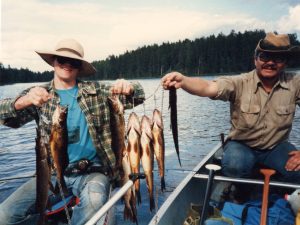
Today we feast…tomorrow, who knows?
(These walleyes had a bronze color from the tannin in the water)
Most campers drink directly from the lake. We were a little more cautious and usually boiled or filtered our drinking water. For mixed drinks we brought gin or rum in plastic bottles along with powdered Kool-aid or limeade for mix. Firewood was plentiful so we didn’t need an elaborate stove. A small one-burner camp stove was nice to heat water for a quick coffee or tea or in case of wet weather. Duluth packs were better than tall hiking packs with aluminum frames because they sit low in the canoe.
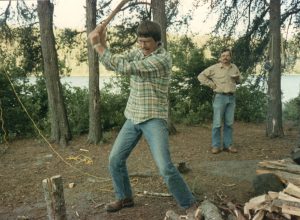
You have to hold your mouth right to chop wood!
We learned to avoid campsites that are close to civilization where bears are accustomed to eating food from dumpsters. We also stayed away from sites with trash from bear raids, because we knew those guys would surely be back.
On moving days we tried to leave as early as possible, but only after a good breakfast. We didn’t stop for lunch, but each person carried a plastic bag filled with “gorp”, a mixture of raisins, nuts, M&M’s, etc. This high energy-protein mixture was enough to get us through the paddling and portaging part of the day. We covered 10-20 miles per day depending on the number of portages, weather, and the physical ability of the people on the trip. Sometimes we came to a place so beautiful that we just had to stop there and camp.
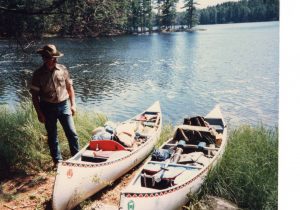
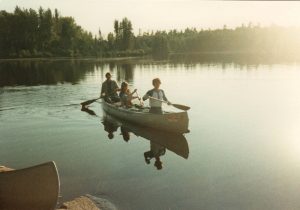
At about 4PM we would try to find a campsite and begin setting up. This was easier during daylight and before everyone was tired and whacked-out. Two persons would gather wood, start a fire and boil some water. Each person would fill his/her cup with Ramen noodles and hot water. This would give us enough energy to set up the tents and make camp. The person who was in charge of the evening meal would start cooking. Others would fish, swim, read, explore, or just loaf. Then we would dine together in style. After dark we would sit around the fire drinking the spiked limeade, listen to the loons and other night sounds, view the Aurora Borealis, tell of the day’s experiences and our great achievements of the past, then collapse into our tents for the night. The following day we would do it all over again.
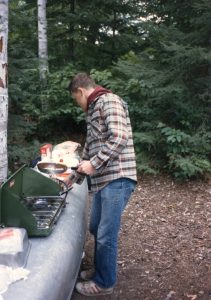
Dave making breakfast
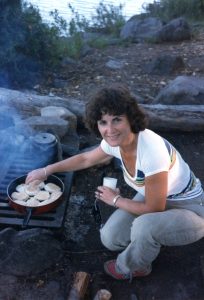
We brought along a French chef
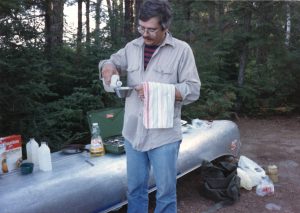
Mark opens the bar
Navigating with a map and compass was a necessary skill since there were no satellites or GPS in those ancient times. Most difficult for me was to estimate distance traveled. This was needed to determine our position on the map. Many places look the same out there, and distances can be very deceiving in the wilderness.
There were many paths and portages. These had been used for years by Indians, French fur trappers and other explorers. They varied from a few yards to over a mile in length. The surfaces varied from wide, flat, and dry to narrow, steep, rocky, muddy, and full of holes and puddles. I once stepped into what I thought was a puddle and went immediately up to my hips in quicksand. I didn’t sink any deeper but I had a canoe on my shoulders and couldn’t get out. I threw the canoe off to the side but I still couldn’t budge. Big Dave Heisler walked up beside me, put his arm around my waist and gave me a huge yank. I heard my knees crack as the suction from the sand tried to keep my legs from escaping, but I finally popped out. There were no permanent injuries but I felt at least a foot taller for a long time after that.
The portages were marked on our maps, but sometimes incorrectly. I once walked up a path that was marked as a portage only to have it peter out after a half mile. I had a canoe on my shoulders and I knew I was in trouble when I heard the branches squeaking louder and louder against the sides of the canoe as the path became narrower. The only thing I could do was find a place wide enough to turn around and retrace my steps.
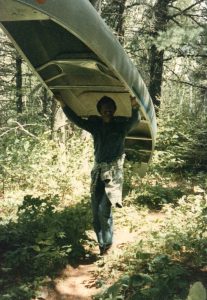
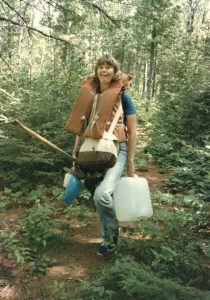
Mosquitoes could be quite a nuisance. The most effective defense we found was 100 percent Deet (we called it “Quetico Cologne”). These pests could be bad in the woods during the evening. They normally didn’t bother us on the lake on a sunny or windy day. We didn’t encounter black flies since we normally traveled in late July and August.
On some trips we started paddling in the U.S. and crossed the border into Canada by canoe. There would be a customs station there and we never had trouble with these guys. On one occasion, however, we decided to drive to International Falls, MN, and cross the border there. Due to the many paper mills in town, that place smelled worse than a skunk with halitosis. Just over the border we drove through a large Indian reservation. I have been in over 50 countries around the world and I can truthfully say I have never seen worse poverty and squalor than in this place.
Upon driving up to the customs station we were in for some excitement. A mean-looking customs officer with a very bad attitude was standing there with some guys that appeared to be new trainees. As soon as I heard the tone of his voice and saw the look in his eye, I could tell that this pompous loudmouth had decided to use this van full of hippies (us) to train his rookies, and was going to shake us down no matter what we said or did.
The conversation went something like this:
Officer: “Where ya headed?”
Dave (who was driving): “Quetico canoe and camping area”.
Officer: “Wacha gonna do in there?”
Dave: “Canoe and camp”.
I’m thinking: (“What the hell did you think we were going to do in there, have a bicycle race?”)
more questions, etc ——
Officer: “Do ya have any drugs along?”
Dave: “No”
(everything OK so far)
Officer: “Do you have any alcohol?”
Dave: “Yes”.
Officer: “How much?”
Dave: “About 5 liters” (we were staying in there for 3 weeks and there were 6 of us)
Officer: ”ABOUT ?? ……… YOU MEAN YOU DON’T KNOW HOW MUCH YOU HAVE??”
(Gotcha! Now we’re in trouble)
The officer then made us take all the alcohol out and line it up on the ground beside the van. It had been repackaged in plastic bottles.
Officer: “WHY DIDN’T YOU LEAVE IT IN THE ORIGINAL GLASS BOTTLES?”
Dave: “We are not allowed to take glass or cans into Quetico”.
I’m thinking: (“ You dumb ass, you don’t even know your own rules!”)
The whole customs crew then crawled all over the van like a swarm of monkeys, gleefully tearing everything apart while we sat on benches beside the building and watched helplessly. They even unrolled our socks and thoroughly inspected our underwear!
I’m thinking: (“You’re enjoying this, you frikkin perverts!”)
When they came upon the white powdered limeade in plastic bags, their eyes lit up with excitement. Now they sounded like monkeys that had seen a lion in the jungle!
After much tasting, conferring and consulting, they finally realized this was really limeade, not cocaine or heroin, and we were just innocent American campers and not international terrorists, so they let us go. It took us a couple of hours to repack our previously carefully packed equipment and be on our way.
Thinking about these camping trips makes me realize how much time a person spends out there just trying to survive. With chopping wood, building shelters, making fires, gathering food, etc, there is not much time or energy left to savor things such as art, music, and other niceties we enjoy as modern humans. This is one advantage we now have that our ancestors didn’t, and I appreciate it much more after each trip into the wilderness.
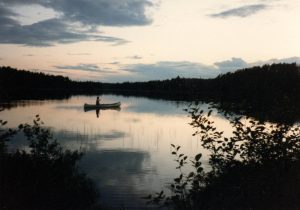
Phantom Lake
The ultimate wilderness trip we made was to Quetico flying in by float plane and paddling out. I will address that one in a future post.
More Photos HERE